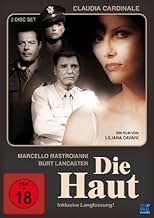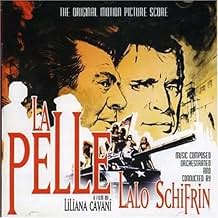NOTE IMDb
6,6/10
1,4 k
MA NOTE
Après la libération de Naples par les Alliés en 1943, la vie des habitants n'est pas beaucoup plus facile, surtout pour les femmes. Beaucoup sacrifient leur dignité et leur moral pour surviv... Tout lireAprès la libération de Naples par les Alliés en 1943, la vie des habitants n'est pas beaucoup plus facile, surtout pour les femmes. Beaucoup sacrifient leur dignité et leur moral pour survivre.Après la libération de Naples par les Alliés en 1943, la vie des habitants n'est pas beaucoup plus facile, surtout pour les femmes. Beaucoup sacrifient leur dignité et leur moral pour survivre.
- Récompenses
- 1 victoire et 2 nominations au total
Peppe Barra
- Sarto
- (as Giuseppe Barra)
Rosaria della Femmina
- Amante di Jimmy
- (as Maria Rosaria Della Femmina)
Histoire
Le saviez-vous
- AnecdotesThe film's editor was Ruggero Mastroianni, Marcello Mastroianni's brother.
- GaffesAt approximately 19 mn into the movie and again at approximately 1h18 mn, Goldberg, the roommate of Jimmy Wren (Ken Marshall), is seen reading an issue of the comic book "Batman". However the cover is clearly shown and is in fact that of issue N°257, published in August 1974, ie 31 years after the events of the movie.
- ConnexionsFeatured in Naples '44 (2016)
- Bandes originalesLa Pelle
written by Roberto De Simone
sung by Maria Kelly
recorded on "La Gatta Cenerentola"
published by La voce del padrone; EMI Italiana
Commentaire à la une
This movie is based on the true memoirs of the main character (Curzio Malaparte) during his time when he acted as diplomatic liaison between the Allied forces and the Italian in the newly occupied Italy. The book is a collection of short stories depicting the collapse of the Italian society under Allied occupation. There is no story line between those short stories. The movie puts them in chronological order, but the reigning chaos and lack of moral message (the message is exactly the lack of morality) can confuse the spectator.
This is a very original war movie, in that the main theme is the not the war front. The Allied are not viewed from their own perspective, which is one of true liberators. Instead, the movie shows the Italian people courting the Allies as liberators in order to escape from starvation. The Allies themselves are caught in a trap where they know the Italian hospitality isn't sincere, but are unable to understand why. They don't realize that before them, the Germans were courted as liberators too, and that in this context of food shortage and general poverty, the only way the Italians have to secure their survival is to play that game.
Malaparte (played by Marcello Mastroiani) acts then as a translator, helping the Americans as a guide would help a tourist, by explaining in each situation why people are acting in this seemingly dishonorable way.
La Pelle (The Skin) would make more sense if compared to Malaparte's twin book on the occupied Europe (Kaputt, or Broken to Pieces). In the latter, he portrays the Nazi way of oppressing through violence. In La Pelle, he shows how the Americans achieve a similar result through economic means, while refusing any responsibility. In Kaputt, Jewish women are made prostitutes by the German Army to escape death by the bullet; in La Pelle, Italian women become prostitutes for the American Army to escape death by starvation.
This is a very original war movie, in that the main theme is the not the war front. The Allied are not viewed from their own perspective, which is one of true liberators. Instead, the movie shows the Italian people courting the Allies as liberators in order to escape from starvation. The Allies themselves are caught in a trap where they know the Italian hospitality isn't sincere, but are unable to understand why. They don't realize that before them, the Germans were courted as liberators too, and that in this context of food shortage and general poverty, the only way the Italians have to secure their survival is to play that game.
Malaparte (played by Marcello Mastroiani) acts then as a translator, helping the Americans as a guide would help a tourist, by explaining in each situation why people are acting in this seemingly dishonorable way.
La Pelle (The Skin) would make more sense if compared to Malaparte's twin book on the occupied Europe (Kaputt, or Broken to Pieces). In the latter, he portrays the Nazi way of oppressing through violence. In La Pelle, he shows how the Americans achieve a similar result through economic means, while refusing any responsibility. In Kaputt, Jewish women are made prostitutes by the German Army to escape death by the bullet; in La Pelle, Italian women become prostitutes for the American Army to escape death by starvation.
Meilleurs choix
Connectez-vous pour évaluer et suivre la liste de favoris afin de recevoir des recommandations personnalisées
- How long is The Skin?Alimenté par Alexa
Détails
- Date de sortie
- Pays d’origine
- Site officiel
- Langue
- Aussi connu sous le nom de
- The Skin
- Lieux de tournage
- Casa Malaparte, Isle of Capri, Naples, Campanie, Italie(Villa of the main character, Curzio Malaparte)
- Sociétés de production
- Voir plus de crédits d'entreprise sur IMDbPro
- Durée2 heures 11 minutes
- Mixage
Contribuer à cette page
Suggérer une modification ou ajouter du contenu manquant






























